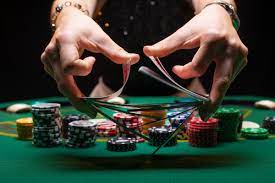In the realm of card games that blend skill, strategy, and psychology, poker stands as an enduring classic. From smoky saloons of the Old West to modern-day casinos and online platforms, آموزش پوکر has evolved into a global phenomenon that captivates players of all backgrounds. Beyond its surface level of luck and chance, poker is a game of calculated decisions, keen observation, and psychological acumen. In this article, we’ll delve into the intricate world of poker, exploring its history, core strategies, psychological dynamics, and the path to mastery.
A Brief History of Poker: From Origins to Worldwide Craze
The origins of poker are shrouded in mystery, with various theories suggesting its roots in Persia, China, or France. However, it was in the United States that poker gained significant popularity during the 19th century. As settlers moved westward, the game evolved and diversified, eventually becoming the quintessential card game of the American frontier.
With the advent of televised poker tournaments in the late 20th century, such as the World Series of Poker (WSOP), the game’s popularity soared to new heights. The “آموزش پوکر” of the early 2000s, fueled by the emergence of online poker platforms, further cemented poker’s status as a global phenomenon.
The Essence of Poker Strategy: Skill, Math, and Adaptability
At its core, poker is a game of strategy. Unlike games purely reliant on chance, such as roulette or slot machines, poker involves skillful decision-making. Successful poker players must blend mathematical calculations with strategic thinking, adapting their gameplay based on the ever-changing dynamics of the table.
- Starting Hand Selection: One of the fundamental decisions in poker is selecting which hands to play and which to fold. Factors like position at the table, the strength of one’s hand, and opponents’ tendencies all play a role in making this crucial decision.
- Reading Opponents: Poker is often described as a battle of wits. Skilled players learn to observe opponents’ behaviors, betting patterns, and body language to deduce the strength of their hands. This psychological aspect adds a layer of complexity that sets poker apart from other games.
- Pot Odds and Expected Value: Calculating pot odds and expected value involves analyzing the potential rewards of a hand compared to the cost of playing it. These mathematical concepts help players make informed decisions about whether to call, raise, or fold.
- Bluffing and Deception: Bluffing is an integral part of poker strategy. A well-timed bluff can convince opponents to fold superior hands, allowing a player with a weaker hand to win the pot. Mastering the art of bluffing requires understanding the psychology of the game and the players involved.
- Positional Awareness: A player’s position at the table relative to the dealer is crucial. Players in later positions have more information about opponents’ actions before making their own decisions, which can influence their strategy.
The Psychology of Poker: Mind Games and Emotional Control
Poker is as much about psychology as it is about cards. Understanding human behavior, emotions, and motivations is a key aspect of becoming a successful poker player.
- Tilting and Emotional Control: “Tilt” refers to a state of emotional frustration or agitation that negatively affects decision-making. Maintaining emotional control, especially after a bad hand or losing streak, is vital to making rational choices at the table.
- Reading and Misleading: As mentioned earlier, reading opponents is essential. However, equally important is the ability to mislead opponents by controlling your own behavior and expressions, giving them a false impression of your hand’s strength.
- Patience and Timing: Knowing when to strike and when to wait is a hallmark of skilled river poker players. Patience is essential, as players often fold more hands than they play. Timing aggression or bluffs can catch opponents off-guard.
- Adaptability: Poker is not a one-size-fits-all game. Successful players adapt their strategies based on the table dynamics, opponents’ styles, and changing circumstances.
The Road to Mastery: Practice, Study, and Continuous Improvement
Becoming a poker master requires dedication, practice, and a commitment to ongoing learning. Here’s how aspiring players can embark on this journey:
- Study the Basics: Understand the rules, hand rankings, and fundamental strategies. Books, online tutorials, and video content can provide a solid foundation.
- Analyze Gameplay: Review your own gameplay and identify mistakes. Learning from losses is just as important as celebrating wins.
- Learn from Experts: Study the strategies of renowned آموزش پوکر players. Many professionals share their insights through books, videos, and articles.
- Practice Bankroll Management: Managing your bankroll is essential for long-term success. Avoid risking more than you can afford to lose and adjust your stakes based on your skill level and bankroll size.
- Experience Live Play: While online آموزش پوکر offers convenience, playing in a live setting adds another layer of complexity due to the physical presence of opponents. Practice in both environments to become a well-rounded player.
- Join Poker Communities: Engaging with fellow players can provide valuable insights, discussions, and opportunities to learn from others’ experiences.
Conclusion
Poker is far more than just a card game; it’s a complex blend of strategy, psychology, and skill. It has captured the imagination of players for centuries, and its allure remains as strong as ever in modern times. To master the art of بازی پوکر requires a combination of mathematical prowess, strategic thinking, emotional control, and a deep understanding of human behavior. As players embark on their journey to poker excellence, they find themselves in a world where the thrill of victory and the agony of defeat are just part of the game’s enduring appeal.




